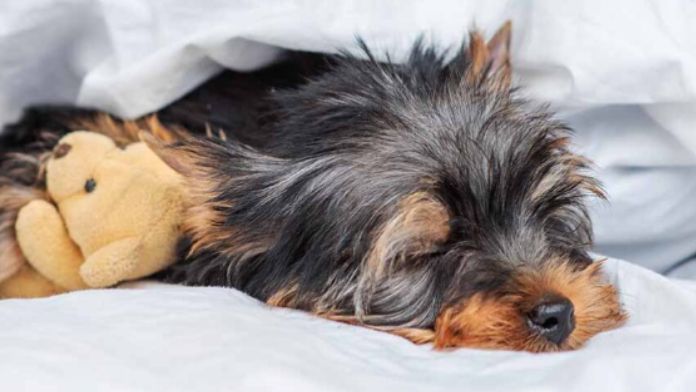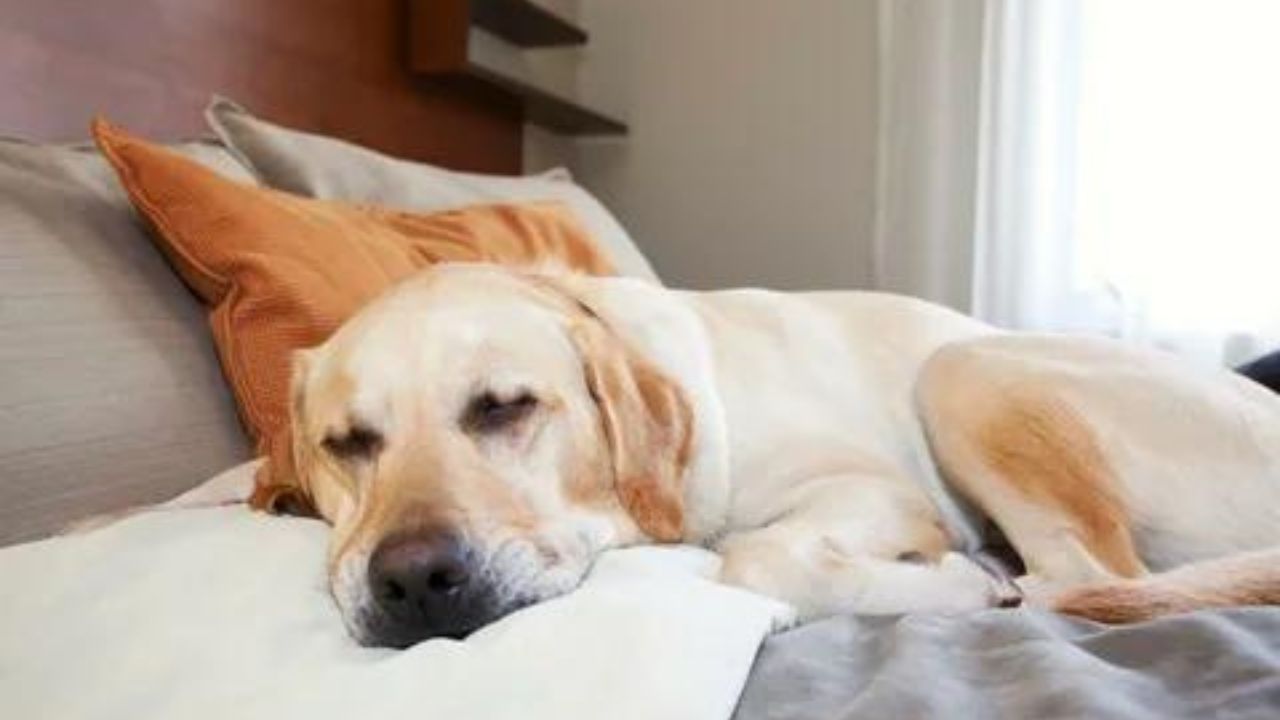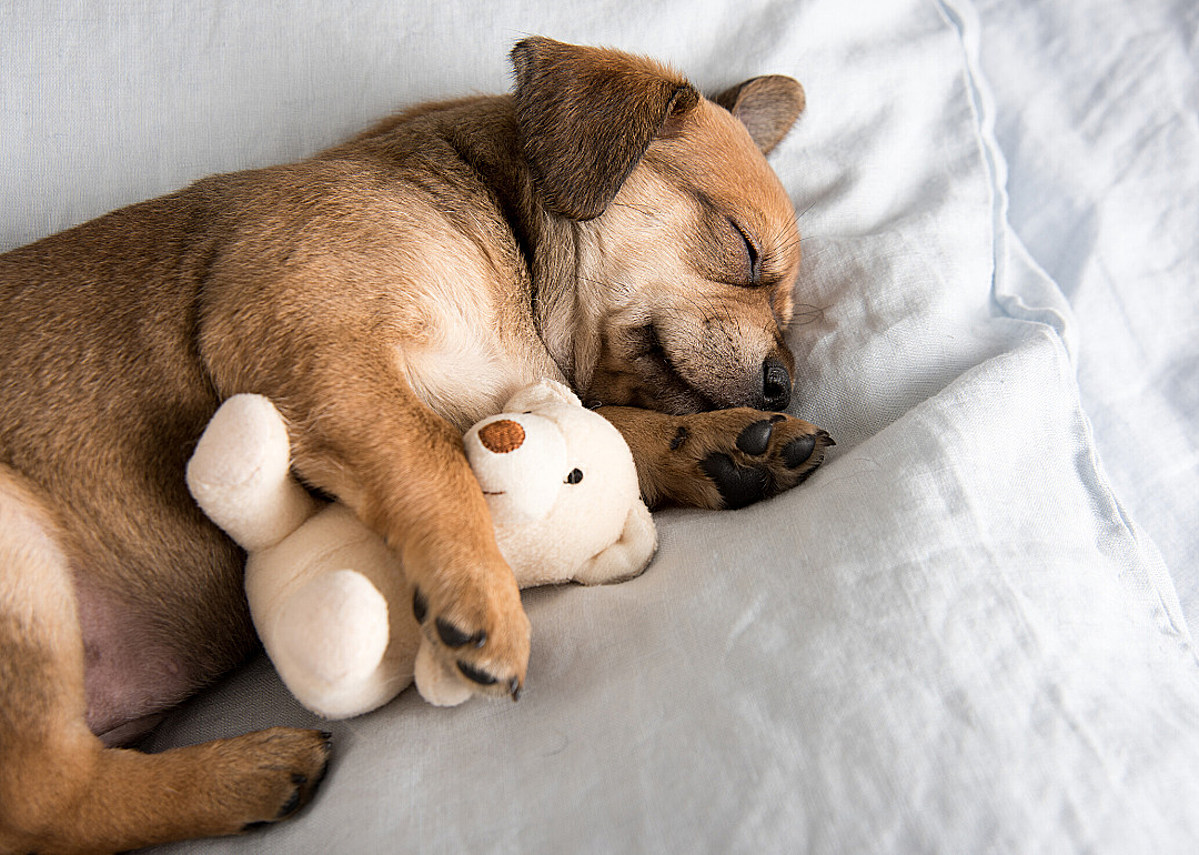
Welcome, fellow puppy enthusiasts! You’ve brought home your adorable new bundle of joy, and you’re already smitten. You’ve given your puppy a cozy bed, toys, and love. But now you’re wondering when to let your puppies sleep outside.
It’s a common question, and the answer is more complex than you think. There are many factors to consider, from your puppy’s breed and age to the weather and shelter availability. And, of course, as responsible pet parents, our primary concern is always the safety and comfort of our furry companions.
But fear not, dear reader! With a little guidance, you’ll soon be able to determine when it’s safe and appropriate for your puppy to sleep outside. So grab a treat, snuggle up with your furry friend, and dive into outdoor puppy slumber.
Throughout this article, we’ll explore the ideal age for puppies to sleep outside, the risks and rewards of outdoor sleeping, and practical tips for making the transition successful. So get ready to learn, laugh, and maybe even howl at the moon with your furry best friend! Continue reading…
Factors To Consider Before Letting Puppies Sleep Outside
As much as we want our puppies to have all the fun and freedom in the world, it’s important to consider several factors before letting them sleep outside. Here are some crucial things to keep in mind:
Breed of the puppy
Different breeds have different tolerances for temperature and weather conditions. For example, breeds with thick furs, like Huskies, can handle colder temperatures better than breeds with shorter hair, like Chihuahuas. Researching your puppy’s breed and considering their specific needs before deciding if they’re ready for outdoor sleeping is essential.
Age of the puppy
Puppies require more attention and care than adult dogs, which also applies to sleeping outside. Young puppies under eight weeks old shouldn’t sleep outside, as they are still developing their immune systems and may be more susceptible to illnesses. As they get older, they can begin exploring the great outdoors, but it’s important to ensure they are ready and comfortable.
Weather conditions
Extreme temperatures, such as cold or scorching heat, can be dangerous for puppies. Additionally, sudden changes in temperature, such as a cold snap or heatwave, can be hard for puppies to adjust to. Check the weather forecast and ensure your puppy has adequate shelter and protection from the elements.
Availability of shelter
Puppies need a safe, comfortable, and secure place to sleep outside. This could be a doghouse, a crate, or a fenced-in area. Whatever the case, it’s important to ensure your puppy has a place to retreat to in case of bad weather, predators, or other outdoor hazards.
Any health concerns
Puppies with health issues like respiratory problems, allergies, or joint pain may not be good candidates for outdoor sleeping. If your puppy has any health concerns, it’s essential to consult with your veterinarian before allowing them to sleep outside.
The Ideal Age For Puppies To Sleep Outside
The ideal age for puppies to sleep outside is typically between 12 to 16 weeks old. This timeframe usually aligns with the point when most puppies have been fully weaned, have completed their initial vaccinations, and have developed the necessary skills and behaviors to thrive outdoors.
It’s important to remember that this is a rough estimate, and some puppies may be ready to sleep outside sooner or later. For example, some breeds may mature more quickly than others. At the same time, puppies with health concerns or special needs may require additional time and attention before transitioning to outdoor sleeping.
In addition to the puppy’s age, other factors may influence the ideal time to start outdoor sleeping. For example, the weather conditions and shelter availability may impact whether it’s safe and comfortable for the puppy to spend the night outside. And, of course, as always, the safety and well-being of the puppy should be the top priority in deciding on outdoor sleeping.
Ultimately, when to let a puppy sleep outside should be based on a careful assessment of the individual puppy’s needs and consultation with a trusted veterinarian or animal behaviorist. With the right preparation and guidance, however, you and your furry friend can enjoy the great outdoors together and create memories that will last a lifetime.
How To Create A Comfortable Sleeping Area
Creating a comfortable sleeping area for your puppy is important to ensure a safe and restful night’s sleep outside. After all, a well-rested puppy is a happy puppy, and a happy puppy makes for a happy pet parent. So, what are some key factors to consider when designing your puppy’s outdoor sleeping space?
First and foremost, the sleeping area should be protected from the elements. This means ensuring your puppy can access adequate shelters, such as a dog house, tent, or covered patio. Ensure the area is dry and free from drafts, and consider adding insulation or heating if the temperature drops. You don’t want your furry friend shivering through the night!
Next, think about your puppy’s bedding. It’s important to provide a comfortable surface for your pup to rest on, as hard surfaces can lead to joint pain and other health issues. A soft, supportive bed or blanket will help keep your pup cozy and reduce the risk of discomfort or injury. If you’re worried about keeping the bedding clean, consider using a waterproof or washable cover.
Another consideration is the location of the sleeping area. Ideally, it should be in a quiet, low-traffic area where your pup won’t be disturbed by noise or activity. If your puppy is particularly sensitive to sounds or smells, consider using noise-canceling headphones or pheromone sprays to help them relax.
Finally, remember to add some personal touches to the sleeping area! Consider placing a few toys or familiar items, like a favorite blanket or chew toy, in the space to help your puppy feel more at home. And if you want to go the extra mile, you could add some decorative touches, like twinkle lights or a colorful rug, to make the space feel like a true home away from home.
Tips For Helping Puppies Adjust To Sleeping Outside
Absolutely! Here are some tips to help puppies adjust to sleeping outside:
- Gradual introduction to the outdoors: If your puppy has never slept outside, it’s important to introduce them gradually to their new sleeping environment. Start by letting them spend short periods outside during the day, gradually increasing the time over a few days. This will help your puppy acclimate to the outdoors’s sights, sounds, and smells.
- Provide comfort and entertainment: Make sure your puppy has a comfortable place to sleep, with a cozy bed and any blankets or toys they enjoy. You can also consider leaving a radio or white noise machine playing to help your puppy relax and feel more at home.
- Maintain a consistent routine: Puppies thrive on routine, so it’s important to establish a consistent bedtime and wake-up time. Stick to a regular feeding and exercise schedule so your puppy knows what to expect and feels more secure.
- Reward good behavior: Positive reinforcement is a powerful tool for training puppies. When your puppy sleeps outside without barking or crying, reward them with a treat or extra snuggles in the morning. This will help reinforce good behavior and encourage your puppy to sleep peacefully outside.
- Keep an eye on the weather: If you live in an area with extreme or inclement weather, ensure your puppy has adequate shelter and protection. Provide a warm, dry place to sleep, and monitor your puppy closely to ensure they are comfortable and safe.
Remember, every puppy is different, and sleeping outside may take some time. Be patient, consistent, and attentive to your puppy’s needs; they’ll sleep soundly under the stars soon enough.
Benefits Of Letting Puppies Sleep Outside
Ah, the great outdoors! There’s nothing quite like the feeling of fresh air in your lungs and sunshine on your skin. And as it turns out, our furry friends can also benefit from a little outdoor time. Let’s take a look at the benefits of letting puppies sleep outside.
First off, sleeping outside can help puppies get acclimated to their environment. Exposing them to the outdoors’s sights, sounds, and smells gives them a chance to explore and become familiar with their surroundings. This can help with socialization and reduce the risk of anxiety and stress.
Studies have shown that puppies who spend time outdoors have better cognitive development and are less likely to develop behavioral problems than those who don’t. That’s because outdoor environments provide a rich sensory experience, with plenty of natural stimuli to keep puppies engaged and learning.
Sleeping outside can also help puppies develop their immune systems. Exposure to natural elements such as dirt, grass, and fresh air can help strengthen a puppy’s immune system and build resistance to common diseases.
But that’s not all. Sleeping outside can be a great way to give your pup some exercise and mental stimulation. Puppies who sleep outside are more likely to be active during the day, which can help them burn off excess energy and prevent destructive behavior. Exploring and investigating their surroundings can help keep puppies mentally sharp and engaged.
Of course, it’s important to remember that sleeping outside isn’t for every puppy. Some breeds may not do well in certain weather conditions, and puppies with certain health issues may need to stay indoors. But for many puppies, the benefits of sleeping outside can be significant. By giving them a chance to experience the great outdoors, you’re setting them up for a happy, healthy life.
Potential Risks Of Letting Puppies Sleep Outside
Of course, let’s talk about the potential risks of letting puppies sleep outside. While it can be tempting to let your furry friend snuggle up under the stars, there are several hazards to be aware of.
Firstly, extreme temperatures can pose a significant risk to puppies. If it’s too cold, they could develop hypothermia; if it’s too hot, they could suffer from heat stroke. Even if your puppy has a cozy bed, blankets, or other forms of insulation, it’s important to monitor the temperature and take appropriate measures to keep them warm or cool, such as using a heat lamp or providing plenty of water.
Another potential risk is the threat of predators or other animals. Even in urban areas, raccoons, skunks, and other creatures can harm your puppy. Coyotes and other wild predators may also be present in more rural areas. It’s crucial to ensure that your puppy’s sleeping area is secure and free from potential intruders, such as by using fencing or other barriers.
Moreover, letting puppies sleep outside increases the risk of getting lost or stolen. Even if your puppy is microchipped, preventing them from wandering off or being taken is still essential. Using a leash or other tethering device can help ensure that your puppy stays in one place, and training your puppy to respond to commands such as “come” can also be helpful in case they escape.
Lastly, puppies that sleep outside may also be at risk of injury or illness. Whether from accidental falls, sharp objects on the ground, or exposure to viruses and bacteria, puppies that sleep outside are more vulnerable to various health risks. It’s essential to keep your puppy up to date on their vaccinations and regularly check their sleeping area for potential hazards.
Conclusion
while letting puppies sleep outside can be a great way to provide them with fresh air, exercise, and a new environment to explore, it’s essential to approach this decision with care and consideration. Before letting your puppy sleep outside, consider their breed, age, health and current weather conditions.
Ideally, puppies should not sleep outside until they are four months old. They should have access to adequate shelter, a comfortable sleeping area, and regular monitoring to ensure their safety. You can also gradually introduce them to sleeping outside by letting them spend short periods outside during the day and gradually increasing the time spent outdoors over a few weeks.
While there are certain risks associated with letting puppies sleep outside, such as exposure to extreme temperatures, the risk of getting lost or stolen, and exposure to predators or other animals, outdoor sleeping has many benefits. These include increased exercise, mental stimulation, and exposure to new sights and smells.
Ultimately, the decision to let your puppy sleep outside should be based on what is best for your furry companion and your circumstances. If you have any concerns or questions about outdoor sleeping, it’s always best to consult your veterinarian or a professional puppy trainer.
FAQ
Do Dogs Prefer To Be Inside Or Outside?
Although it might not be considered cruel to house a pet outdoors during mild weather conditions, dogs are social creatures that flourish with companionship and proximity to their owners. Consequently, they find the most joy in being with their human family members. When a dog is confined solely to outdoor spaces, it often endures feelings of social isolation, potentially leading to behaviors such as barking or howling due to loneliness.
How Do I Train My Dog To Sleep Outside?
Training your dog to sleep outside
- Proper preparation. …
- Find the perfect place to sleep. …
- Bring your familiar things with you. …
- Proceed step by step. …
- Maintain the routine. …
- Safety first! …
- Regular inspections. …
- Achieving your goal with patience.
Can Puppies Sleep Outside Overnight?
Dogs are meant to be kept inside, especially at night. They are pack animals & want to be with their family. If you can’t do that, you would be better off rehoming to someone who can provide the proper home for your puppy.
Can A 2 Month Old Puppy Stay Outside?
According to Dr. Sehaj Grewal, a veterinarian and CEO of The Melrose Vet, puppies can only go outside safely once they’ve completed their third round of vaccinations. You’ll want to wait about seven days after they’ve received their final set of immunizations to give them time to reach their full effectiveness.
What Age Can A Puppy Sleep 0utside?
Puppies can safely go outside after receiving their second set of vaccinations, typically administered at 12 weeks of age. When acquiring a puppy from a breeder or shelter, it’s crucial to ensure that it has already received its initial vaccinations. If so, be sure to obtain its vaccination card or paperwork.








